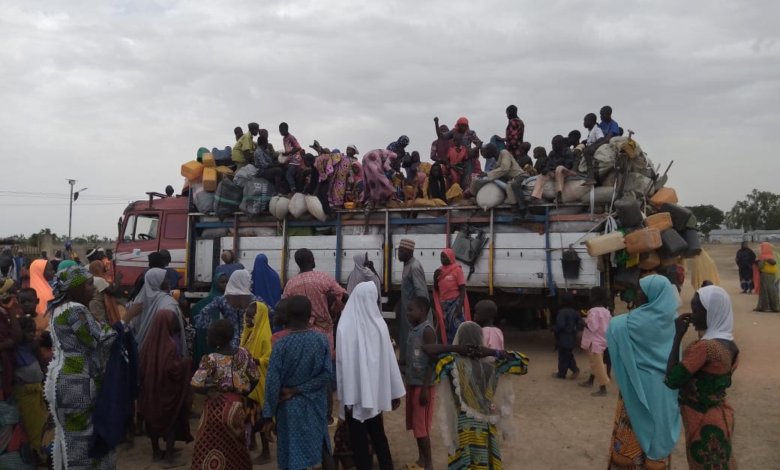Standoff At Adamawa Displacement Camp As Residents ‘Just Want To Leave’
After eight years of living in a camp for internally displaced people in Adamawa, the residents have had enough and just want to return home to Borno. But the camp management say that their destination is still dangerous, and the lorry they’ve hired to get there is a deathtrap.

A battle of wills has erupted between the management of an internally displaced people’s camp in Adamawa and the residents, who have decided they have had enough and just want to go home, HumAngle has learned.
The IDPs at Malkohi camp in Yola have hired a lorry and have begun loading it with their belongings for the journey home to southern Borno, saying they are “fed up with the poor living conditions.”
But the management of the camp are preventing them from leaving, saying the truck is not safe, and their intended destination in Gwoza, Borno state, is not safe for them either.
Naomi Daudu, a displaced woman in the camp located in the capital city of Adamawa, told HumAngle she and other displaced people simply want to leave.
“We are tired,” she says, “they do not take care of us and they have neglected us for so many years. There is no food here, no protection, no support from them.”
After eight years of being displaced in Malkohi, they clubbed together and got ₦500,000 to charter a vehicle and a driver to transport them home in Gwoza Local Government Area in neighbouring Borno state, about 303 kilometres away.
After the chartered lorry arrived at the camp, they had packed their belongings, loaded up the vehicle and were ready to go, when officials of the camp stopped them.
“It is very unfair,” Naomi says in frustration, “the government and whoever is involved have neglected our demands and now that we want to leave for a better place they have stopped us. We have been saving this money for a long time. This is wickedness.”
Not safe
But Muhammed Suleiman, the executive chairman of Adamawa State Emergency Management Agency (AD-SEMA) said the chartered lorry is “not a safe and dignified means of going home.”
He sent HumAngle pictures of the lorry saying the tyres were in a poor state and very dangerous.
In the meantime, he says, calls have already been made to the SEMA in Borno in order to make provisions for IDPs who wish to be reintegrated back to their communities.
He said the agency has identified the problem of hunger and has held emergency meetings with stakeholders to provide immediate relief materials.
Naomi and other IDPs are unrelenting in their decision to leave. She said: “If we stage an uprising in the camp would that be our fault?”
She is worried that this is another ploy from the government to keep them away from a better living.
Promises
Lack of relief materials and protection is a common plight IDPs across Adamawa are familiar with, but it has not always been the situation. Displaced persons usually recount how relief materials used to be abundant but dwindled over time..
Charity Alaja, an aid worker and governance expert, explains that this is due to lack of funding. The aid distribution in Adamawa has reduced gradually over the years because Adamawa “is not on the (aid) ladder anymore”, meaning policies are directed at “reintegrating” displaced people to a community, rather than filling dire need with aid handouts.
In December 2022, IDPs had been promised they would be moved to a resettlement site in the Labando community in Girei LGA of Adamawa.
“In addition to a new home, they will receive 216 square metres of land to use however they see fit, such as for agriculture or to build additional structures,” A report published by the United Nations Office for the Coordination of Humanitarian Affairs (UN OCHA) states.
The report added that classrooms, health centres, and a market are also being constructed and will serve both host communities and the displaced persons including returning refugees.
Hauwa Muhammed, 37, who was also displaced eight years ago, told HumAngle she looks forward to living in a constructed house with windows and doors. Now, almost six months after, displaced persons anticipating resettlement have still not been moved.
They have been left at the mercy of their deteriorating conditions at the camps.
Support Our Journalism
There are millions of ordinary people affected by conflict in Africa whose stories are missing in the mainstream media. HumAngle is determined to tell those challenging and under-reported stories, hoping that the people impacted by these conflicts will find the safety and security they deserve.
To ensure that we continue to provide public service coverage, we have a small favour to ask you. We want you to be part of our journalistic endeavour by contributing a token to us.
Your donation will further promote a robust, free, and independent media.
Donate HereStay Closer To The Stories That Matter




